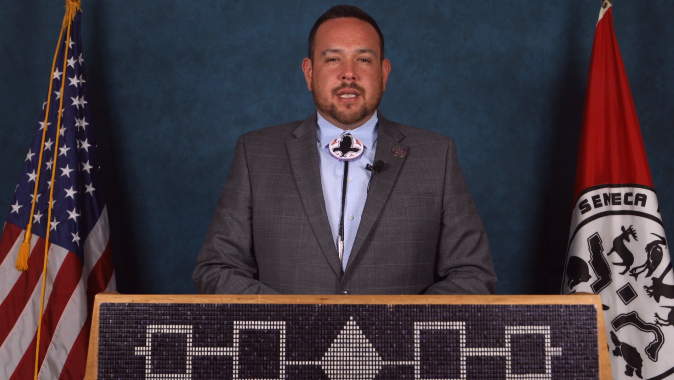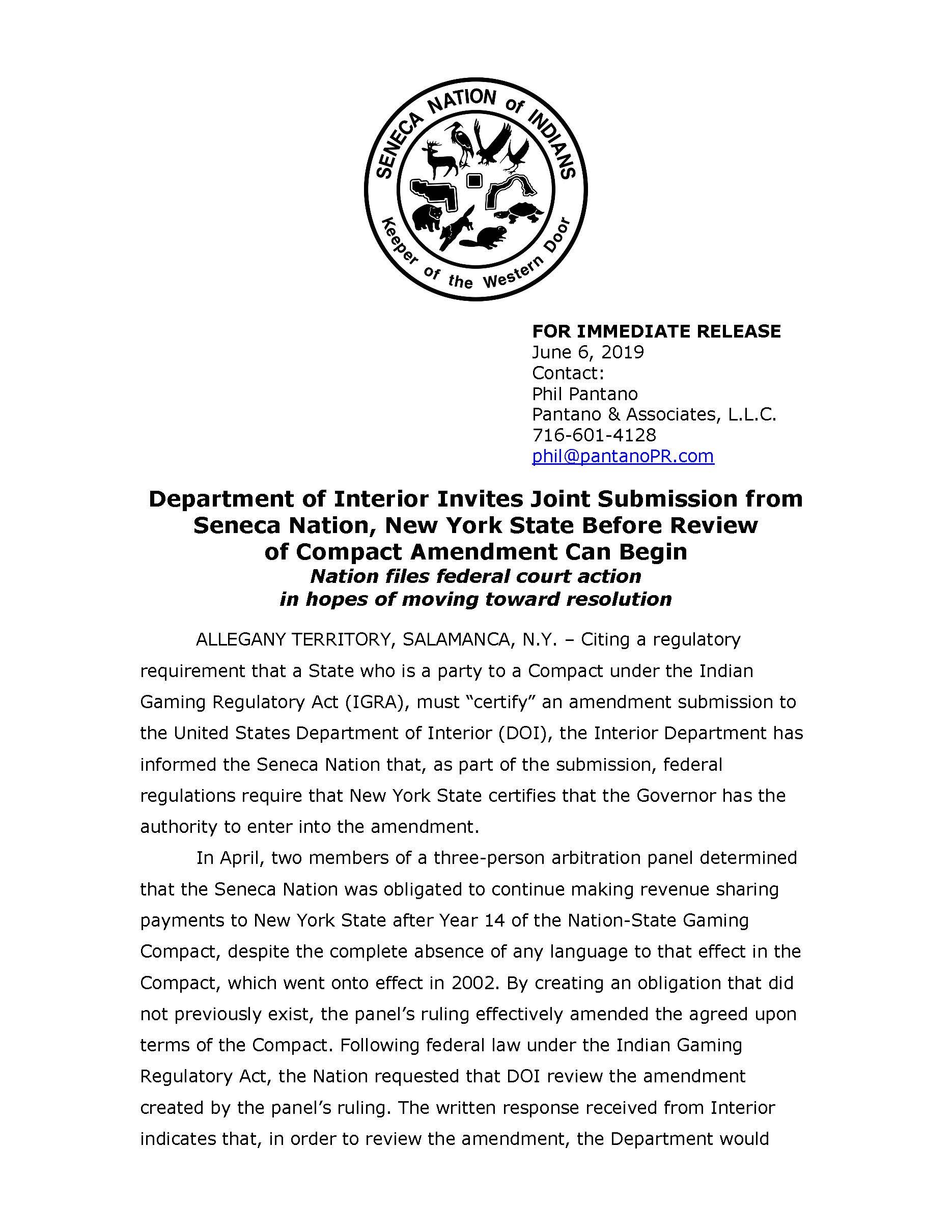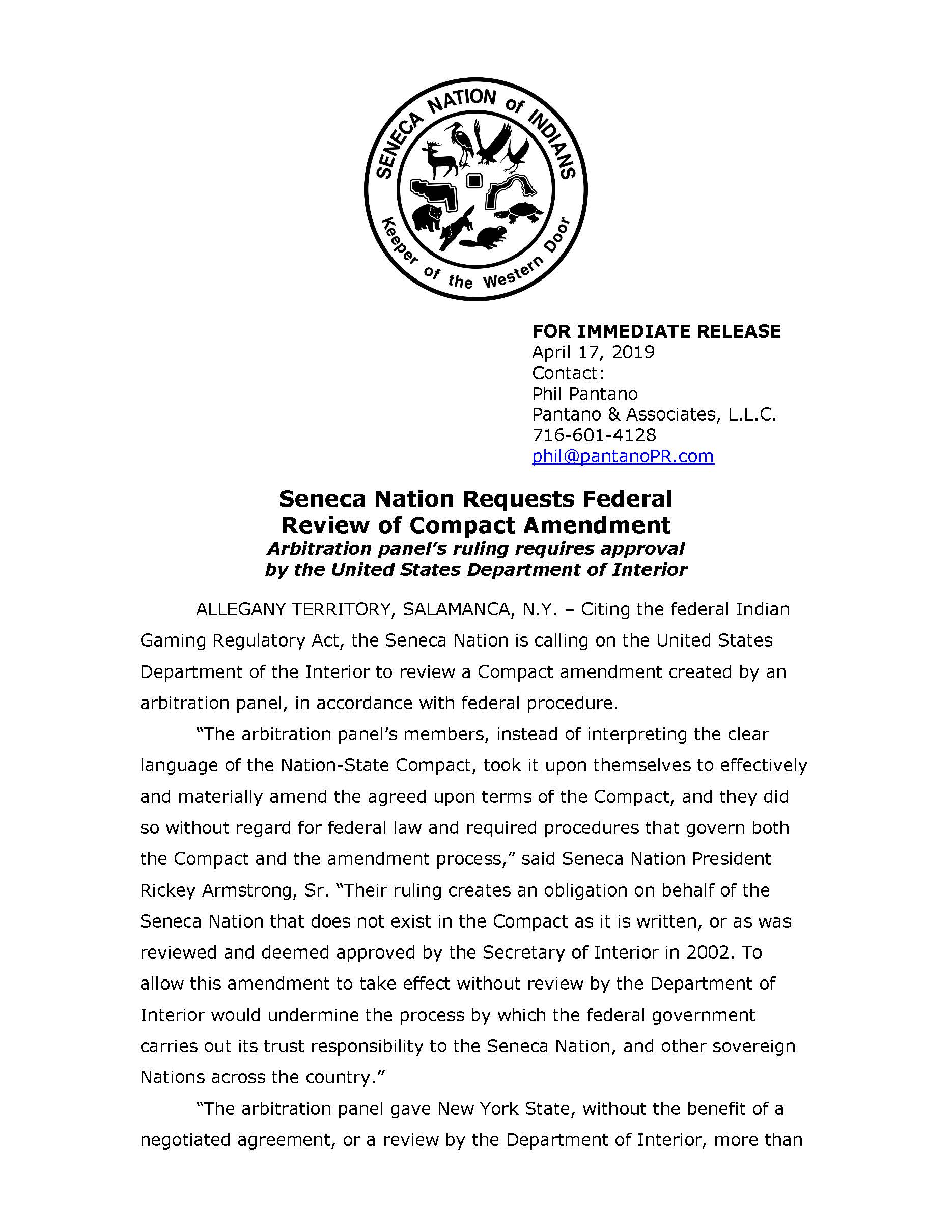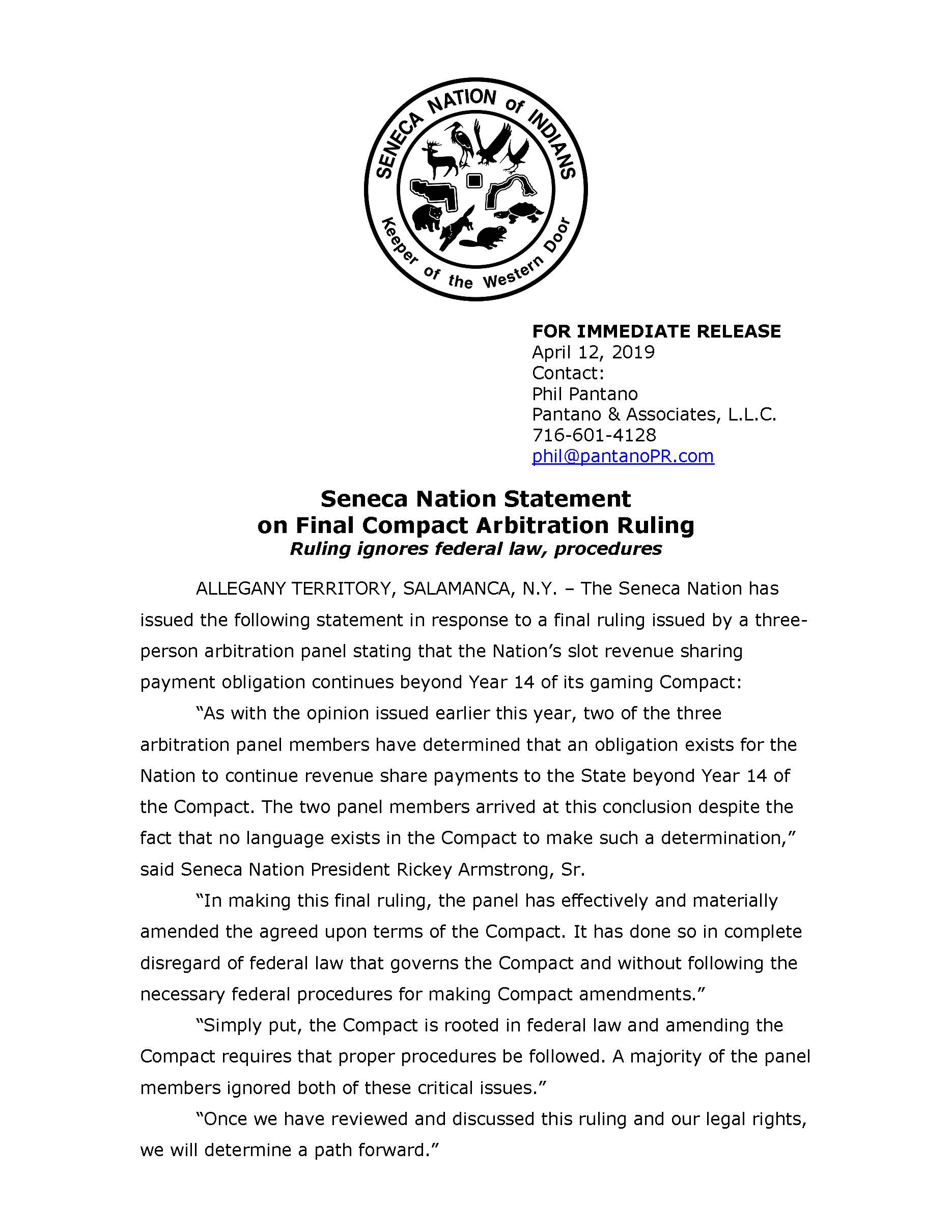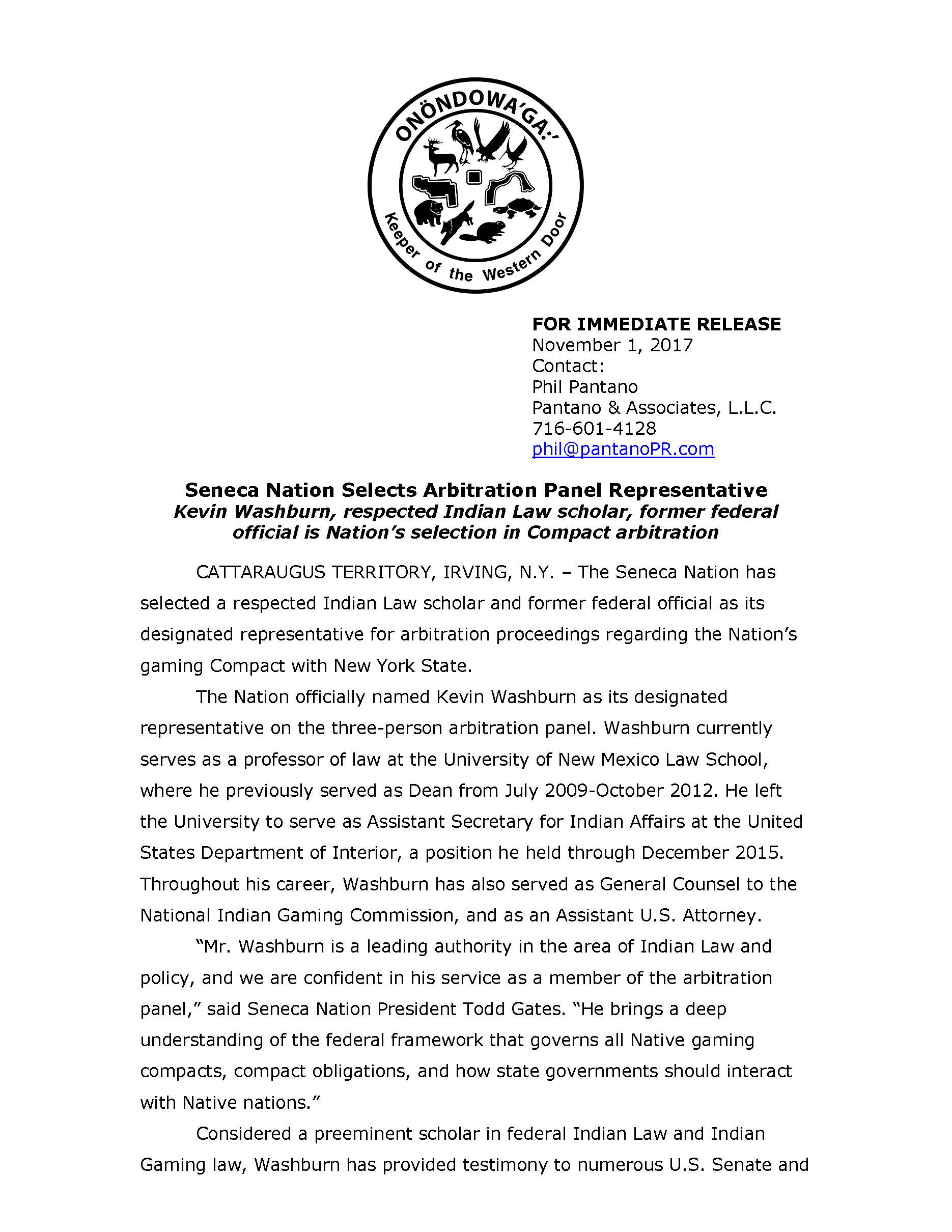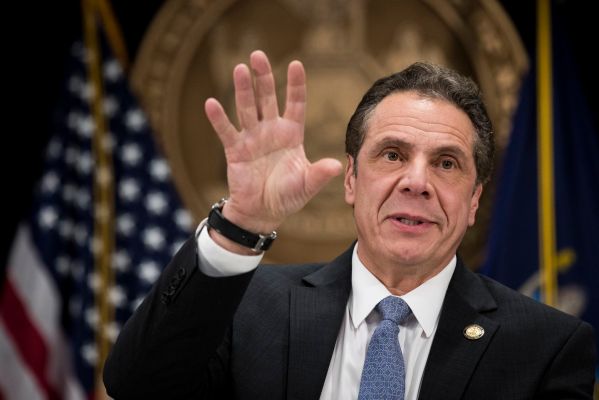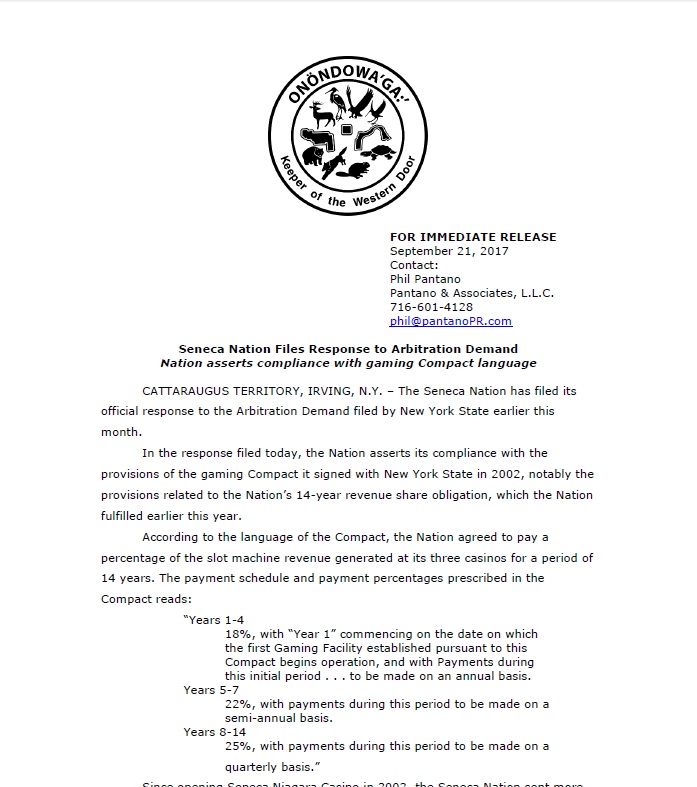The Gaming Compact
In 2002, the Seneca Nation signed a Gaming Compact with the State of New York under the federal Indian Gaming Regulatory Act to establish three “Class III gaming” casino facilities in Western New York.
Since then, the Nation has invested more than $1 billion to develop three world-class gaming destinations – Seneca Niagara Resort & Casino in Niagara Falls, New York; Seneca Allegany Resort & Casino in Salamanca, New York; and Seneca Buffalo Creek Casino in downtown Buffalo, New York – that attract millions of visitors annually.
The Seneca properties are a regional economic driver, directly providing thousands of well-paying jobs to local workers – most of whom are non-Seneca – while further supporting thousands of additional local jobs through the properties’ extensive utilization of local suppliers and vendors.
Under the 2002 Compact, the Nation agreed to pay a portion of its gaming revenues to New York State in exchange for exclusivity west of State Route 14. The State, in turn, distributed a portion of those funds to local governments. Since 2002, the Nation has sent more than $1 billion in revenue share payments to the State.
At the same time, exclusivity granted to the Seneca Nation was eroded by the authorization of State-owned gaming devices at local raceways and by allowing commercial casinos located on the outskirts of the Nation’s exclusivity area to siphon off Nation casino customers and business. New York’s recent authorization of statewide mobile sports betting has continued the trend of eroding the Nation’s competitive position, this time to the benefit of large national gaming providers with no connection or responsibility to Western New York.
Upon completion of the initial Compact term and the Nation’s revenue share obligation in December 2016, the Compact automatically extended for an additional seven years, with no requirement for continued revenue share payments. The renewal did, however, contain provisions allowing either party to negotiate, prior to renewal, any amendment that they required. The State never sought to extend or renegotiate the revenue sharing provision.
In January 2017, the U.S. Department of Interior, the federal agency responsible for approving State-Tribal Compacts, confirmed in correspondence to the Seneca Nation that its obligation to make payments terminated upon the end of the initial 14-year term of the Compact and that payments beyond that date were not required. (See 2017 DOI Letter)
The Nation and the State of New York have since been involved in a dispute over these payments, with the Nation exercising its legal rights to defend its position, as supported by federal law. (SEE DOI/NIGC Letters)
The Nation has long sought to start negotiations with the State of New York to resolve this dispute and come to agreement on terms of a new Compact in advance of the current Compact’s expiration in 2023. Throughout this process, considerable misinformation and false narratives have been advanced. This website aims to set the record straight, offering visitors the truth about the Nation, its gaming operations and the Compact.
Latest Compact Developments
October 2021
Federal Government Reviewing Senecas Gaming Compact With State
Federal Government Reviewing Senecas Gaming Compact With State
September 2021
New York Seneca Tribe May Have Found A Financial Friend In Department Of Interior
https://www.usbets.com/new-york-seneca-tribe-slots-revenue-owed/
Biden Administration steps into Seneca Nation’s casino payment dispute with the state
lhttps://www.newyorkupstate.com/casinos/2021/09/biden-administration-steps-into-seneca-nations-casino-payment-dispute-with-the-state.html
DOI Letter To NIGC
DOI 10793 Letter to NIGC - Seneca Compact
April 2021
Presidential Update 4/23/21
President Pagels provides an important update about the legal dispute with New York State regarding whether the Seneca Nation has fulfilled revenue sharing obligations under the current gaming Compact.
Seneca Nation Requests Court to Stay or Vacate Judgment in Light of Key Interior Department Statement
The Seneca Nation today requested that the federal district court stay all proceedings for 45 days in response to the United States Department of the Interior’s declaration that it has [...]
August 2019
GUEST VIEW: To be fair, Compact decision must follow the law
Recently, the Niagara Gazette editorial board, as well as New York’s lieutenant governor, have opined about “fairness” in the context of New York state’s disagreement with the Seneca Nation regarding [...]
June 2019
Senecas Arguing No Bang for the Buck on Exclusivity Guarantee
At the crux of the matter, the Seneca Nation believes the $1.4 billion in revenue sharing it paid to the state between 2002 and 2016 under the gaming compact did [...]
Department of Interior Invites Joint Submission from Seneca Nation, New York State Before Review of Compact Amendment Can Begin
Citing a regulatory requirement that a State who is a party to a Compact under the Indian Gaming Regulatory Act (IGRA), must “certify” an amendment submission to the United States [...]
May 2019
Letter: Editorial had it wrong on Senecas and gaming
The Buffalo News editorial board opined on May 17 that the Seneca Nation should not be “rewarded with sports betting” while “the Senecas continue to renege on their contractual obligations." [...]
Another Voice: Seneca Nation wants state to honor gaming compact
In a society of laws, rules and procedures matter and they apply to everyone, even the government. This includes the gaming compact signed by the Seneca Nation and New York [...]
April 2019
Seneca Nation Requests Federal Review of Compact Amendment
Citing the federal Indian Gaming Regulatory Act, the Seneca Nation is calling on the United States Department of the Interior to review a Compact amendment created by an arbitration panel, [...]
Seneca Nation Statement on Final Compact Arbitration Ruling
The Seneca Nation has issued the following statement in response to a final ruling issued by a three-person arbitration panel stating that the Nation’s slot revenue sharing payment obligation continues [...]
October 2018
Tompkins Responds to Dyster’s “Grandstanding” Comments
The mayor is suggesting my legitimate concerns about our severe budget deficit are “grandstanding.” He went so far as to say about me: “If he is serious about not using [...]
December 2017
Niagara Falls, NY: Designed To Fail
The city of Niagara Falls, NY is approaching financial catastrophe and people are pointing fingers. Niagara Falls Mayor Paul Dyster is blaming the Senecas. New York State Governor Andrew Cuomo is [...]
DOI Letters Revenue Share 2017
DOI Letters-Revenue Share 2017
November 2017
Another Voice: Seneca Nation has a positive impact on WNY
Our business has grown since its founding in 1950 as a small plastering company to become one of the largest Western New York-based owners and developers of industrial and residential [...]
Seneca Nation Selects Arbitration Panel Representative
The Seneca Nation has selected a respected Indian Law scholar and former federal official as its designated representative for arbitration proceedings regarding the Nation’s gaming Compact with New York State.
October 2017
Another Voice: End of casino sharing will be good for WNY
Hasn’t it occurred to anyone that taking money out of a region hurts its economy? In 14 years of revenue sharing with New York State, the Seneca people have given [...]
At least one New Yorker has eyes on 2020
I think character matters when it comes to our elected officials. I also think we don’t have to wait for an election season to point out concerns about the character [...]
September 2017
Another Voice: Seneca Nation’s interest in dialogue rejected by state
A recent Buffalo News editorial severely colors the facts surrounding the Seneca Nation’s completed payment obligations under our gaming compact, as well as the events of the past six months.
Seneca Nation Files Response to Arbitration Demand
The Seneca Nation has filed its official response to the Arbitration Demand filed by New York State earlier this month. In the response filed today, the Nation asserts its compliance [...]
Letter: Senecas are good neighbors, so let’s resolve differences
After observing the feud between New York State and the Seneca Nation for some time, it is clear to me that both parties should make a concerted effort to resolve [...]
John Kane’s Message To Gov. Andrew Cuomo
John Kane, from "Let's Talk Native... With John Kane", has a message for governor Andrew Cuomo.
MAILBAG: Cuomo should seek positive dialog with Seneca Nation
The latest disagreement between the Seneca Nation and New York State is whether Governor Cuomo is willing to meet with Seneca Nation President Todd Gates. This is an opportunity for [...]




